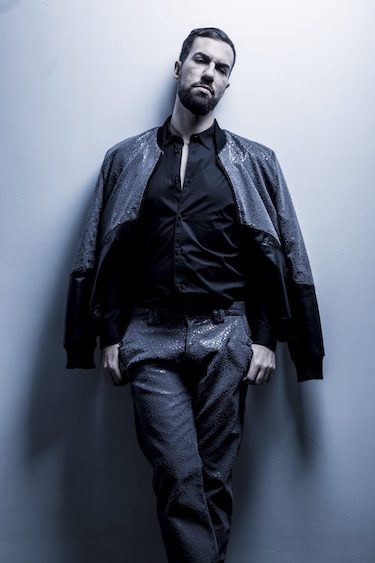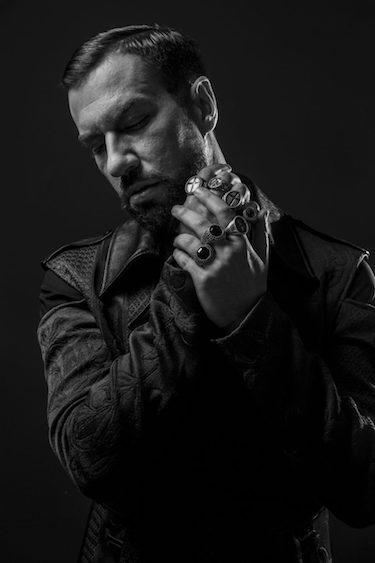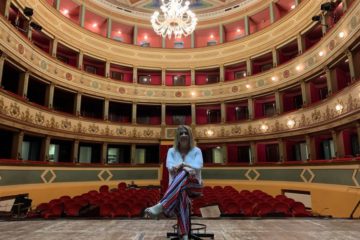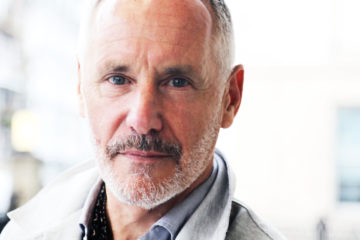Everything is going right for Italian bass Andrea Mastroni; he debuted at the Met earlier this year, he’s releasing his first album soon, and he’s receiving rave reviews left and right. I recently had the opportunity to ask Andrea a few questions about his background, training, and interest in aesthetic philosophy.
You made your Met debut earlier this year as Sparafucile in Rigoletto. How did it feel performing on such a famous stage for the first time?
It was a special moment of my career: you know when a dream comes true? That’s it!
I think every singer, when you’re starting your musical studies, dreams of singing at the Met, Opéra de Paris, at Teatro la Scala or Royal Opera House in London, and every dream of mine came true!
It was like being in a movie because every legendary singer of from the golden age of bel canto has sung there, on that stage and felt that adrenaline.

Andrea Mastroni
Photo credit: Nicola Garzetti
Looking at your repertoire, I see a little bit of everything: German, Italian, and Russian roles. That said, I know many singers tend to “specialize” in a sub-genre or composer. Do you?
Well, I think the bass voice has different artistic perspective and opportunities than other voices. First of all, that happens because this voice grows up over the years and there’s a lot of repertoire, that starts from Monteverdi until contemporary music. In my case I’m a ‘basso profundo,’ as it’s called, so you can choose a large number of roles: my background and my artistic personality is based in Mozart and Handel. This music tends to be very expressive and finding a pure/soft sound, exactly if you would play an instrument, because a lot of composers in the 18th century thought about voices with an instrumental mentality. That helped me a lot because I have sung a variety, from Monteverdi to contemporary music with facility, because you’ve to respect much more every musical dynamics: in my opinion, we’re interpreters, not new composers!
I loved to explore German repertoire because I fell in love with this language, its semantics and its sounds.
I think that I’m very unusual as an Italian opera singer, but I always thought that we’re a musician and we’ve got to be ready to sing very different styles of music: of course it requires a lot of studying, but we work with a changeable instrument and we have to do it!
I understand that you will be releasing a new album soon. Tell me a bit about it.
This was another dream that I’ve had for many years; recording the best Arie di Furore from Händel’s operas! I had this privilege because I met a young Italian baroque orchestra, called l’Accademia dell’Annunciata, and I thought immediately that they could be the right partner to do a special ‘trip’ with the gorgeous Händel music, especially because a lot of sopranos, mezzos and contratenors did the same, but not basses! Specifically, I loved to discover the great vocal personality of the legendary bass Antonio Montagnana, for whom Händel wrote special roles. He could sing long tessitura, coloratura, intensive dynamics and it’s clear that he was an authentic phenomenon, because the bass voice was thought just for secondary roles. I studied this singer a lot – by the way, he was Venetian like me! – and it was a real adventure of artistic and vocal challenge!
Do you come from a musical family? Has opera always been an interest of yours?
I don’t come from a musical family. Music was my own choice. I was very sure about what I loved to do. Just my grandfather was a fanatic of opera and he listened to the great singers like Callas, Tebaldi, and Del Monaco live many times.
I see that you started your musical training as a clarinettist. Do you ever take it out and play anymore?
Not anymore. To play clarinet you’ve to use your breath and your larynx in a different way, so better to not do this anymore! Generally I tell myself that the clarinet helped me to discover my voice!
I read that you studied aesthetic philosophy. Is there something in this field you are particularly interested in?
In my opinion, being an aesthetic philosopher, I love to discover possibilities of what there is behind the music and which is the best way to communicate what is in my mind. In reality, what I understood the theatre (‘il recitar cantando’) has to be real in its intentions; the words have to be sung as if you’re thinking for the first time, because to be a character means to go inside his/her skin and theatre happens, lives and dies in that moment.
I love to discover possibilities of what there is behind the music and which is the best way to communicate what is in my mind.

Andrea Mastroni
Photo credit: Nicola Garzetti
What’s the most challenging role you’ve performed so far?
Surely Osmin in Die Entführung aus dem Serail! The role is a great challenge for a real bass, because after two acts you’ve to sing your final pyrotechnic aria ‘O! Wie will ich triumphieren!’ with cinismo, sadism, coloratura, legato and over two octaves and you’ve to play your deep notes! But it’s a great discipline for the mind and the voice!
How often do you go to the opera as an audience member?
To be honest actually not often! I’m a normal person who loves opera and this is my job. I love jazz, I love other arts and pilates!
Generally I go to to the opera if some friend is singing or because there’s some unusual opera.
Which opera touches your soul?
Don Giovanni! I have sung 98 performances of Leporello, and something always happens on my skin when Giovanni dies. Pure chemistry with this music!


